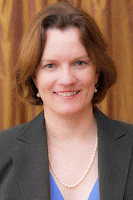NHC President and CEO Maureen Friar recently sat down with Joe Poduska from Housing and Development Reporter to discuss the direction of the organization and its role as a convener within the industry. Read the piece below to learn more about Maureen and where NHC is headed.
 New National Housing Conference Head Outlines Plans for Organization
New National Housing Conference Head Outlines Plans for Organization
Housing and Development Reporter
March 12, 2010
By Joe Poduska
Maureen Friar, the new president and chief executive officer of the National Housing Conference (NHC), said in an interview with HDR that she plans to rely on the organization’s ability to convene a diverse coalition to discuss affordable housing issues, take a position on these issues when warranted, and act as a clearinghouse to exchange information about development models that work at the local level.
Well-known to many NHC members, Friar served as executive director of the Supportive Housing Network of New York (SHNNY) for 14 years. Established in 1988, SHNNY grew from a New York City-based group of about 35 members to 184 nonprofit organizations that developed and operate over 42,000 units of supportive housing across the state.
Friar was active in the New York Housing Conference and in the Housing First campaign that in part led to New York Mayor Michael Bloomberg’s long-term affordable housing plan. SHNNY actively worked to get 12,000 supportive housing units included in the mayor’s plan and in getting an agreement to have 9,000 of these units jointly funded by the city and state.
The result, said Friar, is that New York has a reliable source of funding for supportive housing through a network of bond issuers at the state and city level.
“New York is sort of its own engine of affordable housing,” she said. “The complexity of these projects shows what we can do in terms of creative financing in new development.”
National View
More recently, Friar served as a marketing consultant to the National Equity Fund and as a fundraising consultant to Community Access, a New York nonprofit agency that provides supportive housing, employment training, and advocacy for persons with psychiatric disabilities.
Friar said she became interested in working at the national level on housing issues after leaving SHNNY, and that’s why she turned to consulting and became interested in the NHC post. “I am a big federalist when it comes to housing policy and am excited about the opportunity with a new Administration and who’s at HUD and being able to get things done,” she said.
Among NHC’s strengths, according to Friar, is its ability as an umbrella group to convene its members to study issues and make recommendations. A major affiliate, the Center for Housing Policy (CHP), plays a role in conducting research and providing information that Friar said can be translated into policy. “There is a commitment from the (NHC) board to seize this opportunity of a new Administration and work in this housing climate to make a difference,” she said.
“This is a challenging time to come up with matching funds for states and localities, many of them are financially strapped,” she noted. “So the challenges are great, but there are also opportunities, and so we as an advocacy organization can help eliminate any roadblocks so that money is available and can go out the door.”
Friar said NHC and CHP can also act as a clearinghouse to share information about what affordable housing production models work at the local and state levels.
Diverse Organization
Producing consensus recommendations can be difficult for a diverse membership group like NHC, but Friar had experience with that problem at SHNNY.
“New Yorkers overall are not a compliant group,” she said. “They don’t just all line up, so I am used to opinionated, strong folks. But I also think that the job of the association is to keep the eye on the prize.” The goal is to make effective recommendations, she said.
The objective “is to actually change the status quo so more housing is developed and there is financing and so each project is not so complex because of all the funding streams,” Friar explained. “Getting government to work better, work more efficiently, is a great role for us as an advocacy organization, to be pushing from the outside in making suggestions.”
Another NHC strength, said Friar, is the loyalty of its members to a group that was established in 1931 and whose founders included several New Yorkers. One goal is to bring in the next generation of affordable housing advocates, said Friar. NHC has two major affiliates, the California Housing Consortium and the New York Housing Conference, but NHC could expand by first holding regional conferences, she said.
In addition, NHC held its first educational conference in Chicago last year, and it was successful enough that it is going to become a regular event and will be held again this year, said Friar.
As a coalition of coalitions, NHC needs to choose its issues wisely, Friar said, but it is definitely needed as an advocacy group. “We have entities across the country that develop and finance affordable housing,” she said “There are people involved in housing at the local level who need strong advocacy in D.C. All of these communities are reliant on federal money, so to be their voice in Washington is very important.”
This article was reprinted from Housing and Development Reporter with permission of Thomson Reuters. For more information about this publication, please visit www.west.thomson.com.

